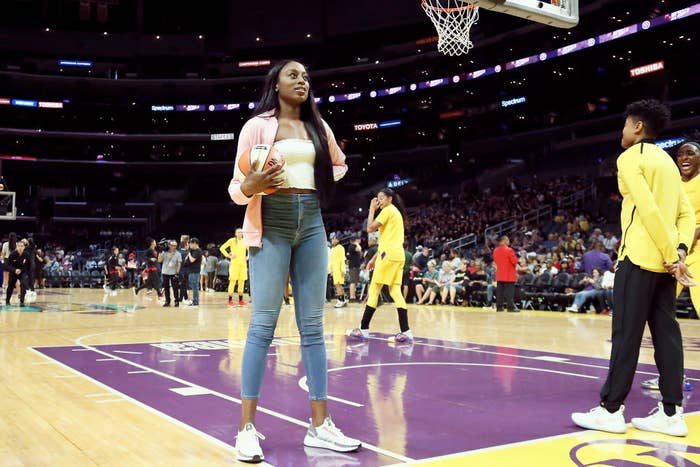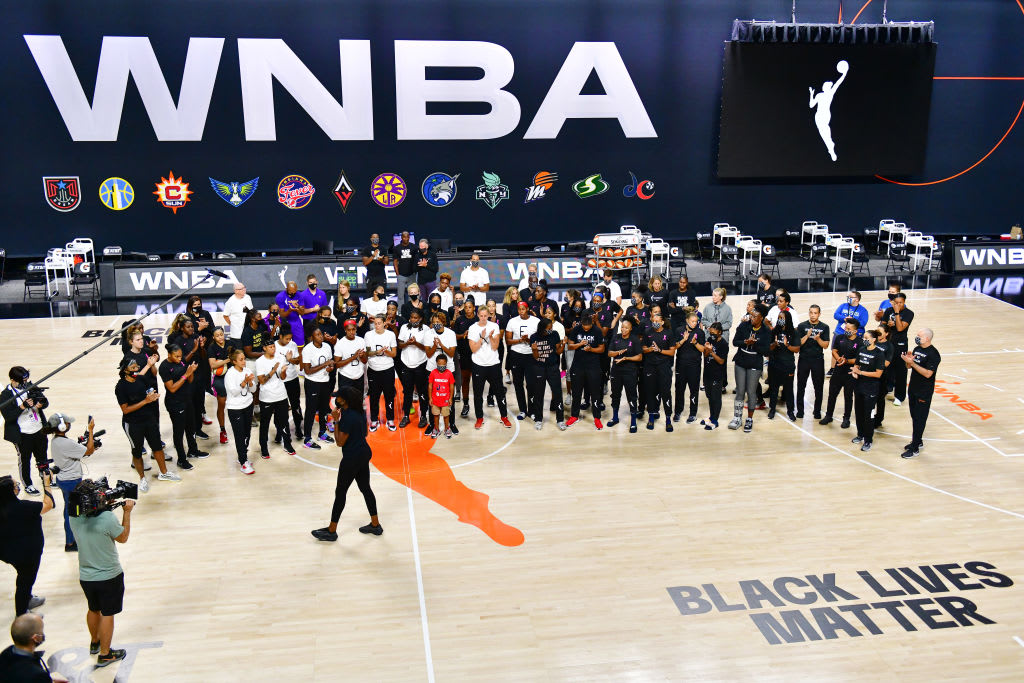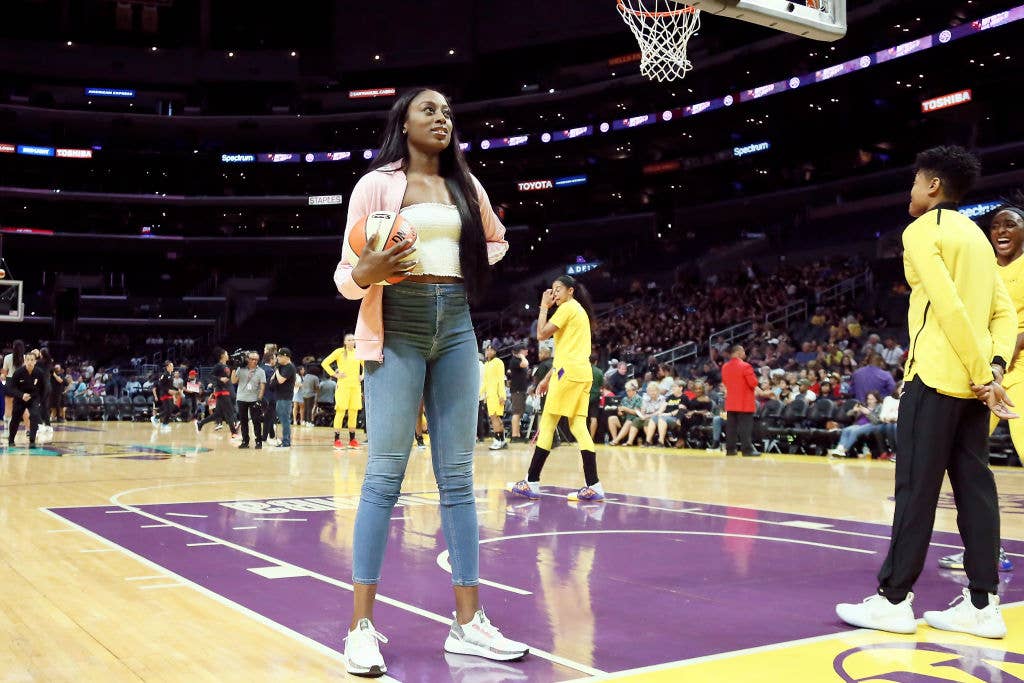
If there’s one thing you’re not going to get from the latest ESPN documentary about the 2020 WNBA season it’s “Wubble” references. Because Chiney Ogwumike—the ESPN personality, WNBPA vice president, and Los Angeles Sparks forward who happens to be an executive producer of the doc titled 144—will tell you that the cuddly nickname given to the league’s bubble in Bradenton, Florida was never really appropriate.
“The Wubble was sort of like facetious and not necessarily up to par of what that experience was,” says Ogwumike. “Wubble sounds fun and goofy. That’s not what the season was at all. We affectionately call it the Wubble just to make fun of it—you know, like, we out here in the Wubble—but it was not ever something that encapsulated the feelings, the emotions. That’s why you see players never really refer to it in a serious, high-level way as the Wubble.”
What you will see in this doc centered on the players who experienced one of the most unique seasons in professional sports history is lots of raw emotion, anguish, frustration, coordination, activism, and ultimately resiliency. 144—pronounce it as “one-forty-four” signinifying the number of players who entered the bubble—was the idea of Ogwumike and her agent Allison Galer. When the league announced it was going to conduct an abbreviated campaign amid the pandemic, and Ogwumike opted out on account of needing to rehab some injuries, she wondered how she could carry her own weight despite not suiting up. The idea of documenting the season came quickly and she made a few phone calls.
“Would there be interest for all of us to work as one team to capture the 2020 season?” Ogwumike recalls asking ESPN and WNBA execs. “There was interest, but the problem is nobody actually did the work to connect the dots. A group phone call [later] and now your girl is executive producing this documentary.”
The doc debuts Thursday, May 13th at 9 p.m. ET and in it you’ll get incredibly intimate looks at the women struggling to concentrate on basketball while last summer’s virus uncertainty and social unrest plays out on their phones. Watching the players formulate a powerful response to the Jacob Blake shooting and their efforts to support the Rev. Raphael Warnock in his Senate run in Georgia are among the highlights.
Of course, not everything the camera crews captured in Florida made the final cut. Ogwumike hopes to create 3-5 minute mini-episodes carved out extra footage for future consumption. She would’ve loved for this to be a three-hour doc—the screener we watched clocked in around 1:15—“but this was your girl’s first time.” It’s also going to be very different from the last basketball doc we all watched on ESPN. So be prepared.
“This is not Michael Jordan The Last Dance where people see Michael Jordan in an armchair and are freaking out because he’s talking to the camera,” says Ogwumike. “But this is the story of women who are equally doing amazing things and we have to reverse engineer and also educate people on why this film deserves the limelight.”
(This interview has been edited and condensed for clarity.)
Tell me how you got involved in the project to begin.
How did I get involved? It came through a little bit of heartbreak because I was not able to play in the 2020 WNBA season and that’s because of my previous injuries. I did not want to put my body through additional risk with a limited time to return to the court. And it was kind of ironic because I spent like the entire pandemic holed up in Houston with my big sister [Los Angeles Sparks forward and WNBPA president Nneka Ogwumike] and we’re just all day on Zoom trying to figure out how to make this season possible because we knew we could not be away from the court for that long. After fighting to make it possible to get the players in, that’s when I was like, ‘Oh shoot, I haven’t factored myself into the equation.’ Is this going to be the right thing for me health-wise because I need four months to get my body right to get ready for a season? Everyone was on-board with that decision for me.
We’ve never been in a setting where all players, an entire professional sports league, were in one place. We need to capture this. So [it became] my personal mission because I was uniquely positioned based on my hard work. People don’t know that I’d wake up at 4 in the morning to drive to Bristol and go do SportsCenter and stay to 2 am doing radio. I was on a Bristol, ESPN grind for four years in Connecticut. That grind got me to a position to now where I’m hosting my own radio show on a variety of platforms and especially in the summer of 2020 being one of the few black women in an analyst position, which is where you naturally give your opinion, people turned to me to articulate what the athletes were going through. My voice was elevated in that 2020 period of the summer with ESPN just naturally so I was able to have conversations internally with ESPN and my agent Allison and I was like we have to figure out how to amplify the amazing work that these players are doing or even just this experience because it’s one of a kind.
Since this was your first time doing a documentary what was the biggest challenge getting it to the finish line?
Ever since we got this project going July 10th—which I [recently] saw my email because someone asked when did Allison and I send the email to [WNBA commissioner] Cathy Engelbert to hop on the phone with ESPN Films—at least two hours of my day has been dedicated to this film. Every day in the bubble I was in coordination with our camera crew on the ground, texting players, ‘Hey, can you be available today for the cameras?’ Allison was doing the same thing with the front office personnel because she’s an agent. This has been our baby for at least two hours of our day ever since this project was green-lit. The hardest thing is this is a project that we have to explain why things matter to people who should already know. It’s almost like hopefully people will understand by watching this and experiencing this we should all be aiming and striving for who have been putting in the work despite the odds.
For what you had in mind when you conceptualized this a year ago to what the finished product ended up being, did it come close to what you envisioned?
Not at all. Not. At. All. Again, we’re coming off watching one of the best documentaries about basketball in The Last Dance. We all watched it during the pandemic. So to have a camera crew like a fly on the wall during the WNBA season, I think our mindset was like, ‘Oh my gosh, I’m a hooper. I can’t wait to show the basketball.’ And that’s absolutely a part of it, but when we got this green-lit we’re like, ‘Ok, we’re capturing the 2020 WNBA season.’ But what we got was way more powerful because we had the trust and vulnerability of the players experiencing some of the most difficult things in their life. Leaving your families in a pandemic. Dealing with coronavirus. Leaving your families during a time of social unrest when people wanted to do more for their communities whether it was protest or just be present. Like, how much did basketball matter to women who had been at the forefront of these conversations? We didn’t know that by the players wearing a certain t-shirt they could change the trajectory of our country. We didn’t know their advocacy would be seen and heard by the highest office in the land.
The initiative to support the Rev. Warnock on his Senate run against former Dream owner Kelly Loeffler got air-time, as one would expect, since it was a significant storyline from the bubble. However, it didn’t get a ton of air-time. Was that a case of wanting to avoid wading into too much political talk or you just couldn’t give enough time to that narrative?
In full candor, this is what the executive producer role [is all about], I spent the last four months trying to book two key interviews: Tamika Palmer, Breonna Taylor’s mother which we accomplished and Senator Warnock. Because think about it, in real-time the players were in meetings, had the great idea, wear t-shirts, and that’s what they did for about a week and they continued to wear the shirt. That’s the real time frame—it was a week or two that they were intentional and then the season goes on. While that was one of the biggest takeaways from the season, even though people will look for that more the reality is it was a very effective and simple activation. Our goal was to interview Rev. Warnock, but unfortunately we weren’t able to before our deadline.

What was the most poignant part of the documentary?
I would say the players-only meeting [following the Jacob Blake shooting]. That to me was the reminder of ‘Oh, wow, I never thought I’d be an executive producer at this age, 29.’ But that was the moment like we’re in this thing. I call my sister, get her to wear a mic. Call the camera crew, get them inside the room. And also having the trust of the players of this league, no player felt threatened by the camera being there. That’s almost impossible to accomplish. So that meeting to me, when I first saw that I see the mic on my sister like, ‘Dang, that’s amazing.’ I remember what it took and she never wavered. That was one. I would say also the moment after. Standing together in solidarity where you see all the women—there’s even a shot of one player that’s on crutches and another player helping that player up—locked arms, you’re hearing Nina Simone in the background “A New Day is Coming.” That crescendo I had goose bumps. It may not seem like a lot, but you’re seeing an entire league of women stand together. And obviously the narration of my sister just hit different for me as well. And the hoops. When we did get hoops, like the small things [of] getting a mic on the hip and hearing those players are reminders of the unique access that we had for this film. Literally having the players miced up for this film was rare.
Breanna Stewart said that all the players in the bubble wanted to be great at basketball while down there, but “looking at the bigger picture we want to make real lasting changes that affect more than just us.” Do the players feel like that goal was achieved?
Oh absolutely. Absolutely. You know how amazing it is when Breanna Stewart who is Finals MVP and you got a taste from her story coming back from an Achilles and she killed it on the court. But she also understands that her experience is bigger than her. She’s feeling the pain by experiencing the pain of her teammates and trying to be an ally and balancing all of that and realizing that is the greater purpose. Being a badass on the court is one thing, but being there for people that need you is the more important element. So I love that from Breanna because like how often do you get a player of that caliber that is so steadfast in her emotion and support of her teammates and her league. And that’s each and every person who stepped to the mic and that’s the story of the documentary.
There’s a scene toward the end where Megan Rapinoe, who entered the bubble, talked to her fiancé Sue Bird about the sense of community she observed. How much of that is going to carry over into this season?
Oh my gosh, there’s no turning back, honestly. We’ve realized—and this is not just the WNBA, but the WNBA has been at the forefront of it—as athletes, it’s one thing to stand for something. And LeBron James made an excellent example of this. He stood for a lot, creating his I Promise School, creating opportunities for others, and even his finances to help empower the next generation. But even a king needs help. Even a king needs queens. I think we’re seeing now that the solidarity between athletes is the new normal because you can play around with one or two of us that can impact that individual at a high level. A lot of people learned that with Colin Kaepernick and his experience. But when you have a league stepping up for its partners that cannot be denied. So that’s the future of athlete activism, realizing when we do it as a collective, when we do it in solidarity, that is the most impactful. That’s why this film is called 144. It takes all of us and that’s what has elevated the WNBA in a way that no other league has seen before.
Was that the hardest championship, or should I say the most impressive championship, in WNBA history?
Yes. Absolutely. One hundred thousand percent. One hundred thousand percent. People that know the WNBA know the competition is always going to deliver. Look at the ratings from last year. We had the biggest growth, like all the metrics are trending. And not just for the WNBA, but women’s sports as a whole. It was the mental aspect, the mental toll, the grueling nature of the season playing so many games in a limited time and also leaving your family and friends in the middle of coronavirus where you don’t know if you’re going to pose a risk upon returning. We had players leave the bubble due to mental health. This was by far the hardest championship just because of the time which we were experiencing in 2020 in this country the pandemic, dealing with the underbelly of racism, and social justice movement. You have a league full of black women who constantly are fighting for respect not just on the court, but off the court in a way that they need to be valued as human beings. Eighty percent of the league is black. That was on the forefront of their minds before they bounced a ball. And oh yeah, go out there and win a championship. There were bigger things at play that could’ve served as a distraction to not accomplish a season, but per usual the women get it done.

